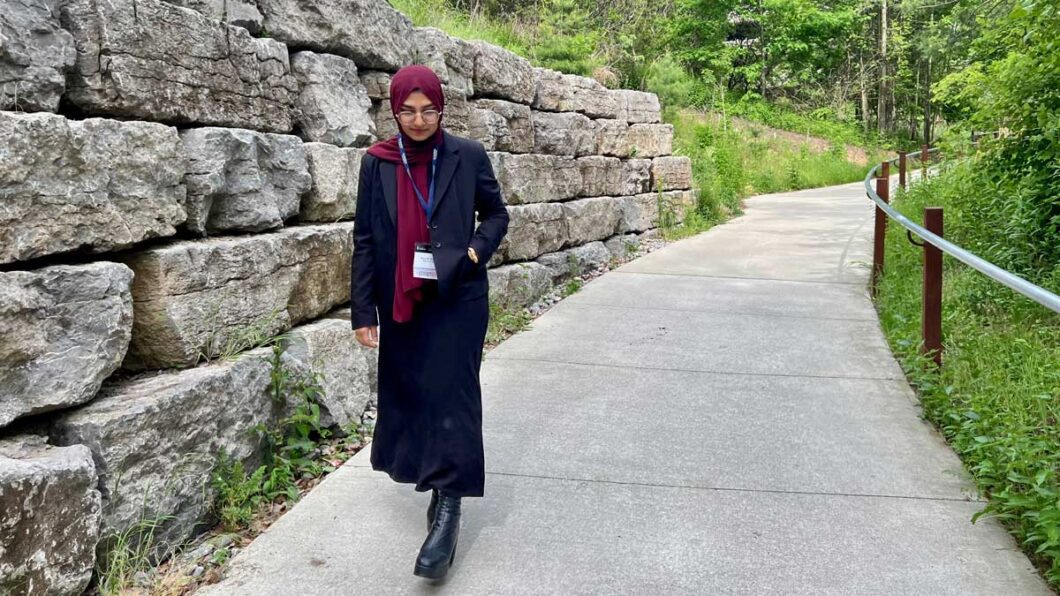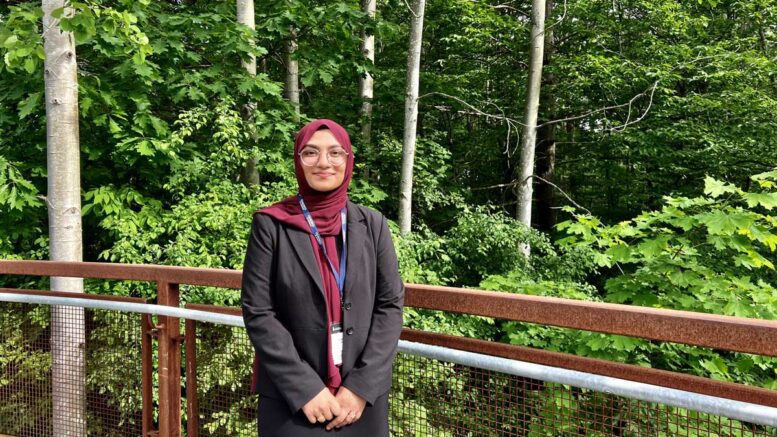In a city where gleaming skyscrapers pierce the desert sky, yachts parade along the coast of the Persian Gulf, and extravagance is a common sight, luxury is a mirage for those in Dubai who struggle to afford basic necessities like health care.
Aliya Ali Shaikha, 21, a neuroscience graduate from the University of Toronto, turned her family’s struggle into a mission to make medicine accessible and affordable for everyone.
She founded a company called Meds for Less that sources medicines from India at a much cheaper price to make them more affordable for people who are uninsured or underinsured.
It has been a journey of learning and discovery filled with challenges, she said.
“Even after two years, I am still figuring things out, Shaikha said. “Building things from scratch is extremely difficult, requires immense organization and time-management skills that I am still learning. Even if it doesn’t work out, the learning, connections, and skills that are built are immense.
“It has changed my life in so many ways,” she said.
A father’s health crisis
Shaikha’s journey began when her 64-year-old father’s health insurance in the UAE became unsustainable. With no provincial healthcare system and private insurance premiums skyrocketing after the age of 60, the family was forced to downgrade to the most basic coverage.
“And then, six months in, he ran out of his health insurance. He reached the medicine limit,” Shaikha said.
“Things like blood pressure, diabetes, cholesterol, and all of that, it got really expensive to the point that we couldn’t afford it anymore.”

Desperate to find a solution, the family turned to India, where generic versions of the same medications were significantly cheaper.
They discovered a 70 per cent savings, even after factoring in doctor’s prescriptions and shipping costs. This realization sparked an idea in Shaikha’s mind: what if she could help others facing similar challenges?
Idea to reality
Shaikha founded Meds For Less in 2022. The company focuses on providing access to generic medications that are produced and shipped from India, which are often significantly cheaper than their brand-name counterparts.
“It’s not just affordability, but it’s also availability and convenience,” said Shaikha.
“Sometimes the medicines are not even available in the UAE, and so if you don’t have friends and family or if you don’t have anybody travelling from India, who’s going to get your medication, right?” Shaikha said.
According to John Hopkins University, generic medicines are 80 to 85 per cent cheaper than their brand-name counterparts.
Shaikha’s goal with Meds for Less is to ensure that uninsured or underinsured people don’t have to compromise their health due to lack of accessibility. Her vision is to minimize the struggle for other families in similar situations as hers was.
WATCH / Neuroscience graduate and entrepreneur discusses medicine affordability
Balancing neuroscience and entrepreneurship
To start Meds for Less, Shaikha had to do a lot of market research, address quality concerns, deal with the teams on India being unresponsive on occasion, all without a co-founder.
Having to do everything by herself, she experienced anxiety while making decisions and was often unsure of what the best course of action was.
She admitted to questioning “whether it’s even worth it anymore. What’s the point of all the effort without any output?”
She said she’s also had “feelings of not being good enough,” and has experienced imposter syndrome when striving to tackle these challenges.
She believes that “reaching out to the right people” has helped her a lot.
Prioritizing, self-confidence and a father’s support
Shaikha also juggled her studies with the demands of running a startup, since she was pursuing her neuroscience degree at the same time.
Prioritization and a strong belief in herself are the traits that enabled her to strike a balance, she said.
“If you tell yourself you can do it, then you can do it,” she said. “You have to believe in yourself. If you don’t believe in yourself, nobody else will.”
Shaikha’s father, Sheikh Ashfaque Ali, 64, an entrepreneur himself, has been a constant source of support and guidance. He describes his daughter as an inspiration.
“She does have within her a very pleasant surprise,” he says. “She has risen up,” Ali said.
Expanding horizons
According to CBC, Canada is the only developed country with a universal healthcare program that does not include universal coverage for prescription drugs.
Meds for Less is currently focused on the UAE, but Shaikha has ambitious plans for expansion, including North America.
However, the path to achieving this vision is not without its challenges. Shaikha and her team are navigating complex legalities, logistical hurdles, and competition from established pharmaceutical companies.
The biggest challenges
Additionally, they face the challenge of educating consumers about the benefits of generic medications and overcoming the stigma associated with them.
In a study conducted by the National Center for Biotechnology Information, 36 per cent of survey participants agreed that generic prescription drugs are inferior to brand name drugs.
“The biggest struggle has always been legalities, but also finding customers and competition. There’s a lot of struggle,” said Shaikha.
She mentioned she copes with obstacles by “talking to my mentors, take some time out, track progress, build a support system.”
Shaikha also mentioned that having a positive mindset and being disciplined helps her persevere and deal with any difficulties that arise.
Read more from the Toronto Observer:
- Aspiring international students to face further competition but fewer hurdles as Canada caps study permits
- Meet the One Of A Kind Show’s youngest entrepreneurs
- Breaking down the numbers: A closer look at Canada’s $46.2B health-care funding
A vision for a healthier future
Despite the obstacles, Shaikha remains determined to make a change. She envisions a world where no one has to choose between their health and their financial well-being.
“Money shouldn’t be stopping people and jeopardizing their health,” said Shaikha.
“It’s not fair. It’s not right and the thing is that people [pharmaceutical companies] are exploiting that [lack of money]. They’re making it so expensive and not caring about people’s health and people are suffering.”
Shaikha said her vision is about empowering people to take control of their health and live their lives to the fullest, and helping facilitate that change.
When thinking about where she sees herself 10 years down the line, she said she sees herself doing “great things.”
“As cliché as it sounds, I want to change the world. I want to do something big. It could be through my startup, it could be through some groundbreaking neuroscience research or discovery.
No matter what it is, I know that I would just want to keep growing, keep learning, and making the world a better place while I do it,” Shaikha said.


